-
 Bitcoin
Bitcoin $84,603.0303
1.65% -
 Ethereum
Ethereum $1,628.2638
2.58% -
 Tether USDt
Tether USDt $0.9997
0.00% -
 XRP
XRP $2.1442
1.55% -
 BNB
BNB $586.1953
0.71% -
 Solana
Solana $129.6970
2.29% -
 USDC
USDC $0.9998
-0.02% -
 TRON
TRON $0.2518
-0.50% -
 Dogecoin
Dogecoin $0.1586
-2.40% -
 Cardano
Cardano $0.6343
-0.80% -
 UNUS SED LEO
UNUS SED LEO $9.3746
-0.17% -
 Avalanche
Avalanche $20.1994
3.26% -
 Chainlink
Chainlink $12.7466
0.99% -
 Stellar
Stellar $0.2381
-0.55% -
 Sui
Sui $2.1883
-1.27% -
 Shiba Inu
Shiba Inu $0.0...01199
-0.40% -
 Toncoin
Toncoin $2.8442
-1.19% -
 Hedera
Hedera $0.1656
0.38% -
 Bitcoin Cash
Bitcoin Cash $324.3031
-5.45% -
 Polkadot
Polkadot $3.7104
0.32% -
 Litecoin
Litecoin $76.9539
-0.90% -
 Dai
Dai $0.9999
-0.01% -
 Hyperliquid
Hyperliquid $15.5187
1.91% -
 Bitget Token
Bitget Token $4.2785
-0.04% -
 Pi
Pi $0.7383
-0.07% -
 Ethena USDe
Ethena USDe $0.9989
0.00% -
 Monero
Monero $215.8052
6.03% -
 Uniswap
Uniswap $5.3859
0.83% -
 OKB
OKB $52.8701
-0.49% -
 Pepe
Pepe $0.0...07327
0.90%
How to send Bitcoin from Bitfinex to KuCoin
Transferring Bitcoin from Bitfinex to KuCoin involves key steps like verifying accounts, obtaining deposit addresses, and monitoring blockchain transactions for confirmation.
Apr 10, 2025 at 05:21 pm
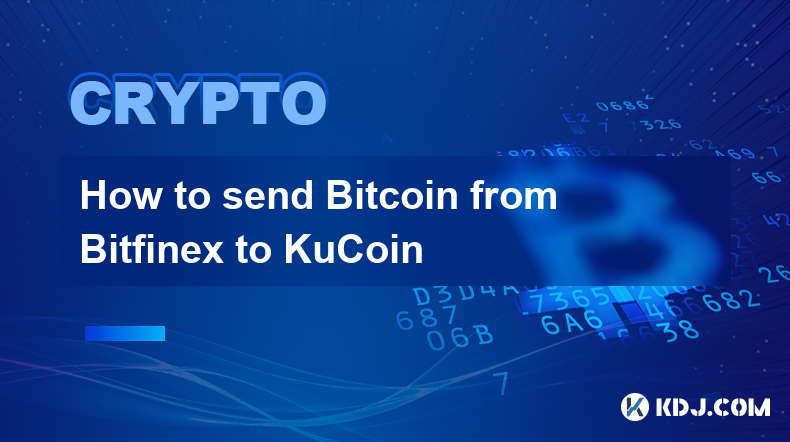
Sending Bitcoin from Bitfinex to KuCoin is a straightforward process that involves a few key steps. Before you start, make sure you have accounts on both exchanges and that you have completed the necessary identity verification processes. It's also important to understand that moving cryptocurrencies between exchanges involves some risks, such as potential delays and transaction fees. To ensure a smooth transfer, it's advisable to double-check all the details before proceeding. This guide will walk you through the process step-by-step, helping you to safely and efficiently move your Bitcoin from Bitfinex to KuCoin.
Step 1: Preparing for the Transfer
Before initiating the transfer, you need to ensure that you have sufficient Bitcoin in your Bitfinex account. Log into your Bitfinex account and navigate to the wallet section to check your Bitcoin balance. Make sure you have enough to cover the transaction amount and the associated fees. Additionally, you should familiarize yourself with the current network fees for Bitcoin transactions, as these can fluctuate and impact the speed and cost of your transfer. It's also a good idea to check the withdrawal limits on Bitfinex to ensure your transfer complies with their policies.
Step 2: Obtaining the KuCoin Bitcoin Deposit Address
To send Bitcoin to KuCoin, you'll need to obtain a Bitcoin deposit address from KuCoin. Log into your KuCoin account and go to the deposit section. Select Bitcoin (BTC) as the cryptocurrency you want to deposit. KuCoin will generate a unique Bitcoin address for you. Copy this address carefully, as any mistake could result in the loss of your funds. It's a good practice to double-check the address before proceeding to the next step. Some users also use the QR code option for added convenience and accuracy.
Step 3: Initiating the Withdrawal from Bitfinex
Now that you have the KuCoin Bitcoin deposit address, return to your Bitfinex account. Navigate to the withdrawal section and select Bitcoin (BTC) as the cryptocurrency you want to withdraw. Enter the amount of Bitcoin you wish to transfer and paste the KuCoin Bitcoin deposit address into the recipient address field. Double-check all the details, including the amount and the address, to avoid any errors. Once you are confident everything is correct, submit the withdrawal request. Bitfinex will process your request and initiate the transfer.
Step 4: Confirming the Transfer on KuCoin
After initiating the withdrawal from Bitfinex, you need to monitor the transaction on the Bitcoin blockchain. You can use a blockchain explorer like Blockchain.com or Blockchair to track the progress of your transaction. Once the transaction is confirmed on the blockchain, the Bitcoin should appear in your KuCoin account. Log into KuCoin and check your Bitcoin balance to confirm that the transfer was successful. If the Bitcoin does not appear within a reasonable timeframe, you may need to contact KuCoin's customer support for assistance.
Step 5: Verifying the Transaction Details
After the Bitcoin has been successfully transferred to your KuCoin account, it's important to verify the transaction details. Check the transaction ID (TXID) on both Bitfinex and KuCoin to ensure that the transfer was completed accurately. You can find the TXID on the Bitcoin blockchain explorer you used to track the transaction. Comparing the TXID on both platforms will help you confirm that the Bitcoin you sent from Bitfinex is the same Bitcoin that arrived in your KuCoin account. This step is crucial for maintaining accurate records and ensuring the security of your funds.
Understanding Transaction Fees and Times
When sending Bitcoin from Bitfinex to KuCoin, you need to be aware of the transaction fees and times involved. Bitcoin transaction fees can vary based on network congestion and the priority you set for the transaction. Bitfinex may charge a withdrawal fee, and KuCoin might have a deposit fee, so it's important to check these fees before initiating the transfer. The time it takes for the transaction to be confirmed on the blockchain can also vary, typically ranging from 10 minutes to several hours. Understanding these factors will help you plan your transfer more effectively and avoid any surprises.
Security Considerations
Security is paramount when transferring cryptocurrencies between exchanges. Always use two-factor authentication (2FA) on both Bitfinex and KuCoin to protect your accounts. Be cautious of phishing attempts and never share your private keys or seed phrases with anyone. It's also a good practice to use a hardware wallet for storing your cryptocurrencies when not actively trading. If you're transferring a large amount of Bitcoin, consider breaking it into smaller transactions to minimize risk. Always double-check the recipient address before confirming the transfer to avoid sending your funds to the wrong place.
Troubleshooting Common Issues
Sometimes, issues can arise during the transfer process. If your Bitcoin does not appear in your KuCoin account after a reasonable amount of time, first check the transaction status on the blockchain explorer. If the transaction is confirmed but the funds are not showing up, contact KuCoin's customer support. If the transaction is stuck or not confirmed, you may need to wait longer or consider using a transaction accelerator service. If you entered the wrong address, unfortunately, there's little that can be done, as Bitcoin transactions are irreversible. Always double-check the address before sending.
Best Practices for Future Transfers
To ensure smooth and secure future transfers, follow these best practices:
- Always double-check the recipient address before sending.
- Use 2FA on all your exchange accounts.
- Keep your private keys and seed phrases secure.
- Monitor transaction fees and network congestion before initiating a transfer.
- Consider using a hardware wallet for long-term storage.
- Break large transfers into smaller amounts to minimize risk.
- Keep records of all your transactions, including TXIDs, for future reference.
By following these guidelines, you can enhance the security and efficiency of your cryptocurrency transfers.
Common Questions Related to Sending Bitcoin from Bitfinex to KuCoin
Q: How long does it take to transfer Bitcoin from Bitfinex to KuCoin?
A: The transfer time can vary based on network congestion and the transaction fee you set. Typically, it can take anywhere from 10 minutes to several hours for the transaction to be confirmed on the blockchain.
Q: What are the fees associated with transferring Bitcoin from Bitfinex to KuCoin?
A: Bitfinex may charge a withdrawal fee, and KuCoin might have a deposit fee. Additionally, you'll need to pay the Bitcoin network fee, which can vary based on network conditions. Always check the current fee structure on both exchanges before initiating a transfer.
Q: Is it safe to transfer Bitcoin between exchanges?
A: Transferring Bitcoin between exchanges can be safe if you follow best practices such as using 2FA, double-checking recipient addresses, and keeping your private keys secure. However, there are always risks involved, so it's important to be cautious and vigilant.
Q: What should I do if my Bitcoin transfer is delayed?
A: If your Bitcoin transfer is delayed, first check the transaction status on a blockchain explorer. If the transaction is confirmed but the funds are not showing up in your KuCoin account, contact KuCoin's customer support. If the transaction is stuck, you may need to wait longer or consider using a transaction accelerator service.
Q: Can I cancel a Bitcoin transfer after it has been initiated?
A: Once a Bitcoin transaction is broadcast to the network, it cannot be canceled. If you realize you've made a mistake, such as sending to the wrong address, you'll need to wait for the transaction to be confirmed or potentially use a transaction accelerator service to speed up the process. However, once confirmed, the transaction is irreversible.
Disclaimer:info@kdj.com
The information provided is not trading advice. kdj.com does not assume any responsibility for any investments made based on the information provided in this article. Cryptocurrencies are highly volatile and it is highly recommended that you invest with caution after thorough research!
If you believe that the content used on this website infringes your copyright, please contact us immediately (info@kdj.com) and we will delete it promptly.
- Vaulta Emerges from Its Past with a Renewed Focus on Practical Finance and Compliance-First Blockchain Infrastructure
- 2025-04-15 04:50:13
- Render Network (RNDR), SEI and Bittensor (TAO) lead crypto AI sector despite 5% daily drop
- 2025-04-15 04:50:13
- HYPE is showing early signs of a bullish reversal, with a potential inverse head and shoulders pattern forming
- 2025-04-15 04:45:13
- BlockDAG (BDAG) Captures Developer Attention with Complete Smart Contract Features and Growing $214M Presale
- 2025-04-15 04:45:13
- title: RWA-Focused Crypto Project MANTRA (OM) Loses $5.431B of Market Cap in Overnight Collapse of Its Native Token
- 2025-04-15 04:40:15
- Trump's Tariffs Just Supercharged Bitcoin – Here's What's Coming
- 2025-04-15 04:40:15
Related knowledge
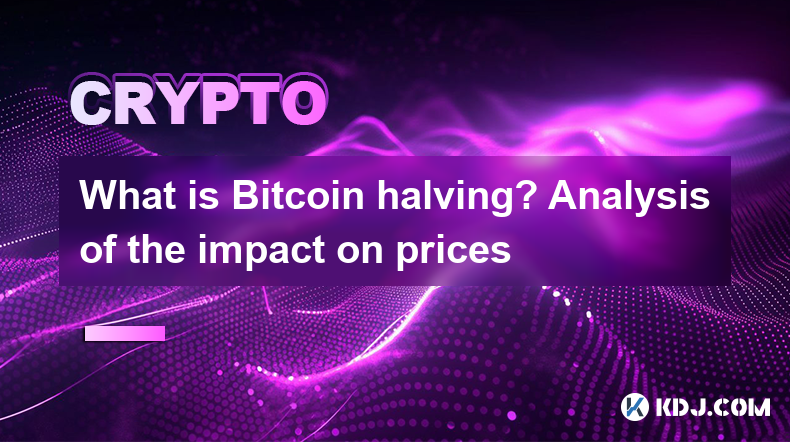
What is Bitcoin halving? Analysis of the impact on prices
Apr 09,2025 at 01:14pm
Bitcoin halving is a pivotal event in the cryptocurrency world that occurs approximately every four years, or every 210,000 blocks. The event is designed to reduce the rate at which new bitcoins are generated, thereby controlling inflation and increasing scarcity over time. During a halving, the reward that miners receive for successfully adding a block...
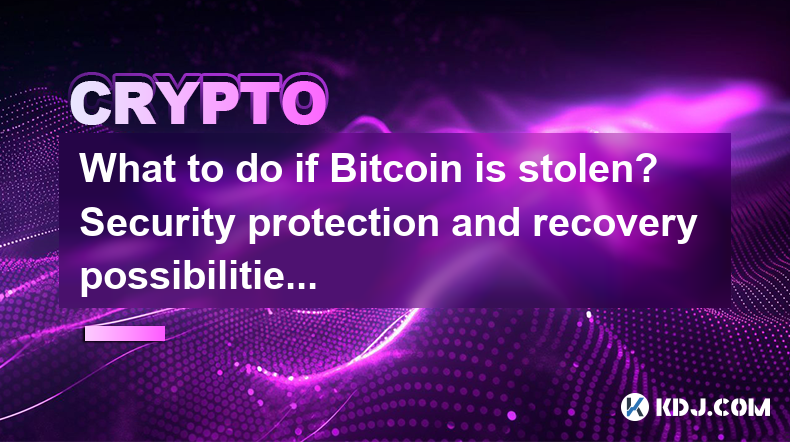
What to do if Bitcoin is stolen? Security protection and recovery possibilities
Apr 09,2025 at 03:42pm
If your Bitcoin is stolen, it can be a distressing experience, but there are steps you can take to protect your remaining assets and attempt to recover your lost funds. This article will guide you through the process of securing your Bitcoin and exploring recovery possibilities. Immediate Actions After Bitcoin TheftThe moment you realize your Bitcoin ha...
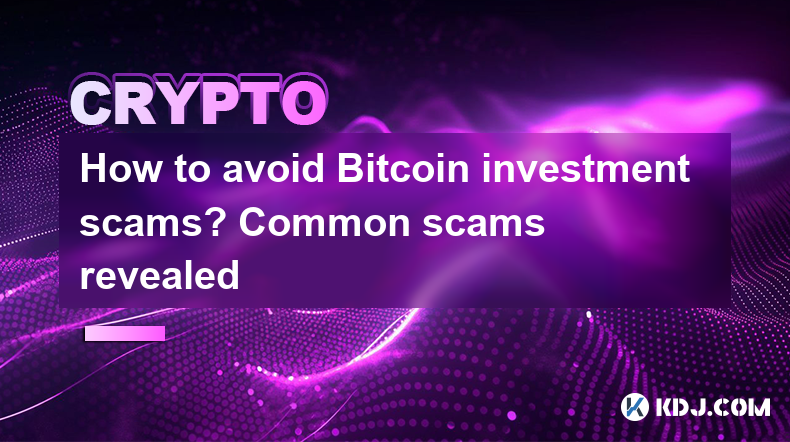
How to avoid Bitcoin investment scams? Common scams revealed
Apr 10,2025 at 05:14pm
Introduction to Bitcoin Investment ScamsBitcoin and other cryptocurrencies have become increasingly popular investment options, attracting both seasoned investors and newcomers alike. However, with the rise in popularity, there has also been a surge in Bitcoin investment scams. These scams can range from Ponzi schemes to fake exchanges and fraudulent in...
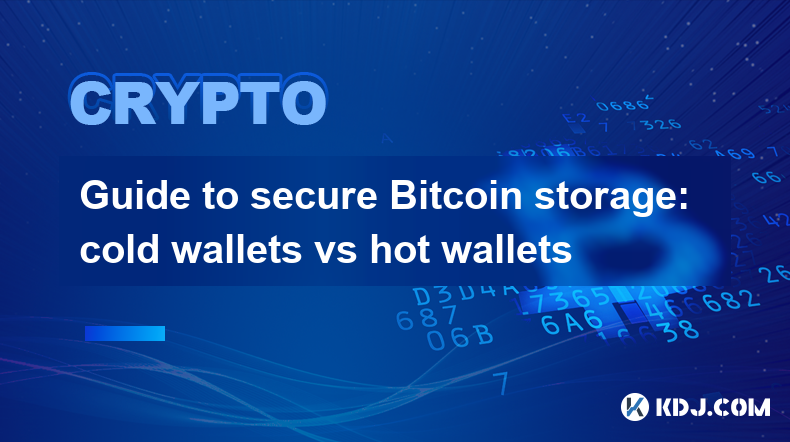
Guide to secure Bitcoin storage: cold wallets vs hot wallets
Apr 11,2025 at 08:42am
Guide to Secure Bitcoin Storage: Cold Wallets vs Hot Wallets When it comes to storing Bitcoin, security is paramount. The choice between cold wallets and hot wallets can significantly impact the safety of your digital assets. This guide delves into the differences between these two types of wallets, their respective advantages and disadvantages, and how...
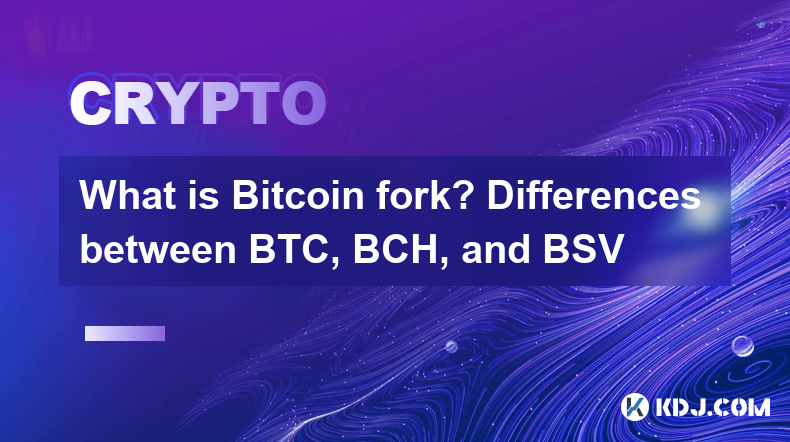
What is Bitcoin fork? Differences between BTC, BCH, and BSV
Apr 10,2025 at 02:21am
A Bitcoin fork refers to a change in the underlying protocol of the Bitcoin blockchain, which results in a divergence into two separate versions of the blockchain. This can happen as a result of a disagreement within the community about the direction of the cryptocurrency, or to introduce new features or improvements. There are two main types of forks: ...
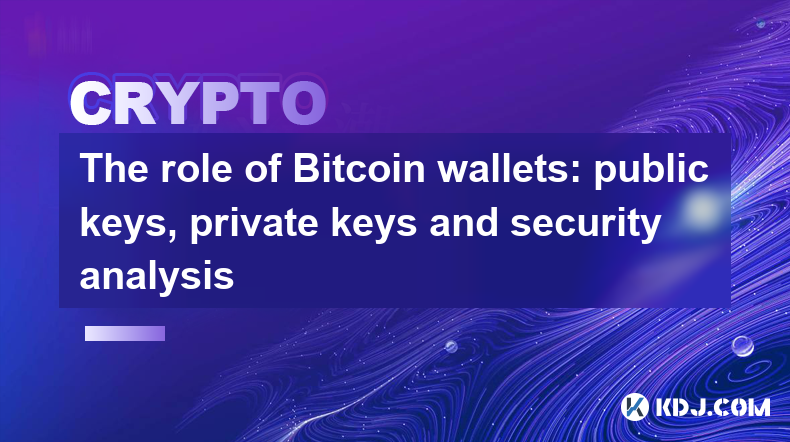
The role of Bitcoin wallets: public keys, private keys and security analysis
Apr 09,2025 at 03:00am
Bitcoin wallets play a crucial role in the world of cryptocurrency, serving as the gateway to securely store, send, and receive Bitcoin. Understanding the intricacies of Bitcoin wallets, particularly the concepts of public keys, private keys, and security analysis, is essential for anyone looking to navigate the cryptocurrency landscape safely and effec...

What is Bitcoin halving? Analysis of the impact on prices
Apr 09,2025 at 01:14pm
Bitcoin halving is a pivotal event in the cryptocurrency world that occurs approximately every four years, or every 210,000 blocks. The event is designed to reduce the rate at which new bitcoins are generated, thereby controlling inflation and increasing scarcity over time. During a halving, the reward that miners receive for successfully adding a block...

What to do if Bitcoin is stolen? Security protection and recovery possibilities
Apr 09,2025 at 03:42pm
If your Bitcoin is stolen, it can be a distressing experience, but there are steps you can take to protect your remaining assets and attempt to recover your lost funds. This article will guide you through the process of securing your Bitcoin and exploring recovery possibilities. Immediate Actions After Bitcoin TheftThe moment you realize your Bitcoin ha...

How to avoid Bitcoin investment scams? Common scams revealed
Apr 10,2025 at 05:14pm
Introduction to Bitcoin Investment ScamsBitcoin and other cryptocurrencies have become increasingly popular investment options, attracting both seasoned investors and newcomers alike. However, with the rise in popularity, there has also been a surge in Bitcoin investment scams. These scams can range from Ponzi schemes to fake exchanges and fraudulent in...

Guide to secure Bitcoin storage: cold wallets vs hot wallets
Apr 11,2025 at 08:42am
Guide to Secure Bitcoin Storage: Cold Wallets vs Hot Wallets When it comes to storing Bitcoin, security is paramount. The choice between cold wallets and hot wallets can significantly impact the safety of your digital assets. This guide delves into the differences between these two types of wallets, their respective advantages and disadvantages, and how...

What is Bitcoin fork? Differences between BTC, BCH, and BSV
Apr 10,2025 at 02:21am
A Bitcoin fork refers to a change in the underlying protocol of the Bitcoin blockchain, which results in a divergence into two separate versions of the blockchain. This can happen as a result of a disagreement within the community about the direction of the cryptocurrency, or to introduce new features or improvements. There are two main types of forks: ...

The role of Bitcoin wallets: public keys, private keys and security analysis
Apr 09,2025 at 03:00am
Bitcoin wallets play a crucial role in the world of cryptocurrency, serving as the gateway to securely store, send, and receive Bitcoin. Understanding the intricacies of Bitcoin wallets, particularly the concepts of public keys, private keys, and security analysis, is essential for anyone looking to navigate the cryptocurrency landscape safely and effec...
See all articles























































































